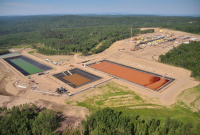In a 5-4 decision, the Supreme Court of Canada has ruled that Alberta rancher Jessica Ernst cannot sue the province's energy regulator regarding fracking activities on her land that contaminated her well's aquifer so strongly, she could light her tap water on fire.
The highly-anticipated decision closes one chapter in a decade of legal action during which Ernst sued the Calgary-based Encana for negligence, nuisance and trespass, along with Alberta’s Ministry of Environment for failing to conduct adequate investigations. She also sued the provincial regulator for failing to prevent her aquifer in Rosebud, Alta. from being contaminated by toxic chemicals, including methane.
Encana, a natural gas company, was fracking nearby coal beds for methane gas when her aquifer was contaminated northeast of Calgary.
The Supreme Court rejected Ernst’s attempt to sue the Alberta Energy Regulation (AER) on grounds it had violated her constitutional right to free speech under the Charter of Rights and Freedoms in the Canadian constitution when it asked her not to go public with her complaints.
Ernst’s lawyers were disappointed in the results, which means the end of the road for her claim against the regulator.
“In my view, the regulator treated her very badly,” said Cory Wanless of Klippensteins Barristers and Solicitors in Toronto. “Unfortunately, they will not be held to account for that behavior.”
Suing for freedom of expression
A vocal opponent of fracking, Ernst first filed her suit against Encana and the Alberta Energy Regulator (AER) in 2007, after the regulator told her in 2005 that it would no longer engage with her, and refused to explain why. When it finally did by letter, the regulator said it would only communicate with her if she agreed to raise her concerns directly with them and not go to the media or the public.
In October 2006, Ernst wrote to the AER again asking for freedom of communication, but did not get an affirmative response until March 2007. Ernst's suit in the Supreme Court hinged on the 16-month period where she claims she was denied her Charter rights of freedom of expression, a grievance for which she was asking $50,000 in compensation.
“The dissent makes clear that the kind of misconduct alleged by Jessica Ernst could be a serious violation of Charter rights and should be addressed by the law,” said University of Ottawa law professor Lynda Collins, who studies environmental law, after the decision was released on Friday morning. “The majority appears to agree that a regulator punitively refusing to deal with a citizen could violate the Charter but suggests a different procedural route for addressing these concerns.”
In 2013, the regulator had asked the Alberta Court of Queen's Bench to dismiss Ernst’s case, saying that even if her allegations were true, it had no chance of success due to a section of the Energy Resources Conservation Act that grants immunity to the regulator from lawsuits.
Later that year, the Court of Queen's Bench agreed with the regulator and dismissed the case. The Alberta Court of Appeal agreed. In Friday’s decision by the Supreme Court of Canada, four justices also agreed with that decision, and four disagreed, arguing that the regulator had not conclusively proven that Ernst’s legal argument was fundamentally flawed.
Bid rejected by Supreme Court
Justice Rosalie Abella cast the deciding vote. In the end, the Supreme Court decided that because Ernst's lawyers had questioned the constitutionality of the Energy Resources Conservation Act section granting immunity to the AER from lawsuits, without doing so before in the lower courts, it was inappropriate to allow the matter to proceed.
“Ms. Ernst had the opportunity to seek timely judicial review of the Board’s decision,” wrote Abella in her reasons. “She chose not to. Instead, she attempted to frame her grievance as a claim for Charter damages. That is precisely why Section 43 exists —to prevent an end-run by litigants around the required process, resulting in undue expense and delay for the Board and for the public.”
The four dissenting judges, led by Chief Justice Beverley McLachlin, felt that Ernst's case was novel but did have an arguable claim to proceed. They also said that it was not plain and obvious that judicial review would have offered the chance for vindication or deterrence that Charter damages would have.
“The dissent came back powerfully saying that Ernst wasn’t challenging the adjudication – she was challenging the fact that she wasn’t allowed to get to the point of adjudication, that essentially the door was closed to her,” said Collins. “The dissent says that it’s not clear to us that this is threatening the immunity of judges and decision makers.”
Because of the narrow ruling, it focused only on the technical merits of the motion to strike, and not the substance of Ernst's claims that the regulator violated her Charter rights.
Future claims possible for Ernst
“The judgment is probably neutral when it comes to the future of environmental constitutional claims,” Collins added. “It’s obviously a loss for Jessica Ernst; however it doesn’t shut down the possibility to bring a claim like this in the future.
"It’s very technical, and I know that the people who supported Ernst felt that the very important issues of environmental protection, public health and democracy had gotten lost in the legal technicalities, and that’s an understandable concern.”
The BC Civil Liberties Association, an intervenor in the case, expressed disappointment in the decision.
“The Charter guarantees everyone the right to an appropriate and just remedy if their constitutional rights are violated, but a majority of the Court has now said that in some circumstances, legislatures may shield certain government administrative decision makers from Charter scrutiny,” says Laura Track, counsel for BCCLA.
“This decision has worrisome implications for people across the country seeking to hold government-appointed decision makers accountable for egregious unconstitutional actions.”
While the case was decided on narrow technicalities, it leaves open the possibility that other challenges can be made against similar regulators if they are seen to be acting in a punitive manner, as Ernst had alleged with the Alberta Energy Regulator.






Comments
This decision is a tragedy for all Canadians who believe that we actually have Charter rights, and especially for the people of Alberta who have been and are being harmed by actions of the oil and gas industry. The regulator has no mandate to act in accordance with the public interest. There is no real recourse for those affected by the actions of this industry or its captured regulator.
"Because of the narrow ruling, it focused only on the technical merits of the motion to strike, and not the substance of Ernst's claims that the regulator violated her Charter rights."
The above statement is accurate, the SCC did not address the merits of the Charter violation presented, yet, the AER press release, claims the exact opposite.
"Supreme Court of Canada Ernst v. Alberta Energy Regulator decision
For immediate release
Calgary, Alberta (Jan 13, 2017)… Today’s Supreme Court of Canada (SCC) decision is an important one to regulators across the country. This was an important decision affecting the ability of regulators to carry out their responsibilities, which was evident in the participation of other provinces in the proceeding in support of the AER.
The decision has validated the position held by the AER that the claims against the AER’s predecessor, the Energy Resources Conservation Board (ERCB), should be dismissed. The Court did not find there was a breach of Ms. Ernst’s Charter rights, and made no findings of negligence on the part of the AER or its predecessor the ERCB. The Court recognized that permitting the claim would hinder the AER’s ability to carry out its statutory duties effectively and in the public interest.
The AER appreciates that the courts at all levels took the time to carefully consider this important matter and in each instance issued clear, well-reasoned decisions.
The Alberta Energy Regulator ensures the safe, efficient, orderly, and environmentally responsible development of hydrocarbon resources over their entire life cycle. This includes allocating and conserving water resources, managing public lands, and protecting the environment while providing economic benefits for all Albertans."
Additionally, the AER suggests in this release, they operate in the public interest. They do not.
Two falsehoods in one press release, this is the cornerstone of a regulator that owes no duty of care to the public and is granted legal immunity from our Supreme Court.
"Removal of the Public Interest Test
A related omission is the disappearance of the public interest test currently found in section 3 of the ERCA. Section 3 is the general provision that currently requires the ERCB to make decisions on energy projects “in the public interest, having regard to the social and economic effects of the project and the effects of the project on the environment”. It is fundamental to the ERCB’s current mandate. The fact that it is not included in Bill 2, nor replaced with anything obvious is surprising.
But the more glaring change in Bill 2 is the removal of the right to a hearing for someone who has convinced the ERCB that they have rights that may be directly and adversely affected by a Board decision on an application (ERCA, s 26(2))."
"Under Bill 2, even if someone is directly and adversely affected and has filed a statement of concern, section 33 states that the AER “shall decide in accordance with the rules and subject to section 34, whether to conduct a hearing on the application.”
...that Bill 2’s approach of allowing Cabinet to appoint the hearing commissioners (including the chief hearing commissioner) for indefinite terms and to set their remuneration raises important questions about the level of independence of the AER from the government. As he states, “[o]ne of the defining characteristics of quasi-judicial administrative processes in Canada is independence from the executive.”
Unfortunately, as noted by Massicotte, there is no mention of the policy management office in Bill 2, nor is there any information “as to the degree of interaction between the policy functions of Alberta Energy and AESRD, and the regulatory functions of the single Regulator.”
"Moreover, the Discussion Document also talked about public engagement and consultation in the creation of policy. Unfortunately, there is nothing in Bill 2 discussing such avenues for public participation in energy and resources development policy-making."
http://ablawg.ca/.../an-overvi...
“It is unclear why the Alberta government has chosen to omit any reference to “public interest” in REDA or the Regulations made under REDA.
...While the omission of any reference to “public interest” in both REDA and the Responsible Energy Development Act General Regulation can be assumed to be deliberate and purposeful, it is not entirely certain what effect this omission will have. Unless otherwise clarified, this is an issue which will likely have to be determined by the Regulator or the Courts at some point in the future.”
http://blg.com/en/NewsAndPubli...
With the AER under Bill 2 (REDA) people have no right to object, no right to concerns, no right to a hearing, no right to participate, no right for engagement, no right to refuse entry of oil and gas companies, nor right to proper monitoring or testing for land, water or air quality impacts, and no public interest or public health protections, which translates into no right to judicial review.
In the event that one does get past all the aforementioned, and the upper Court hears their grievance, the AER would simply invoke their updated immunity clause from Division 5 of Bill 2:
"Protection from action
27 No action or proceeding may be brought against the Regulator, a director, a hearing commissioner, an officer or an employee of the Regulator, or a person engaged by the Regulator, in respect of any act or thing done or omitted to be done in good faith under this Act or any other enactment."
http://www.qp.alberta.ca/docum...
Let us also review the reality of judicial review. It would likely cost $50,000 to $100,000 or more, to which you are not awarded damages or full recovery of costs if successful. If unsuccessful, you will pay your costs and that of the AER. A positive ruling for the plaintiff, would merely point out the AER erred in a decision making process, but could, or would not do anything to reverse operations on ones property or mitigate impacts. Such civil or professional liability cases are an entirely different matter between private lease agreements and/or oil and gas operators. The judicial process is so glacially slow and intentionally decelerated by the AER's legal team, the well site or facility would likely be inactive or abandoned by the time the action sees resolution.
In the end, the action is doomed to fail, since the SCC has emboldened the AER's immunity clause and powers with this ruling. Who in their right mind would even pursue judicial review, even if they could? No-one, and the AER is profoundly aware of this, and uses it to their advantage. The SCC should have the legal and professional acumen to see through the unconstitutional nature of how the AER operates and used the Ernst appeal to protect the public interest and create a remedy for Canadians in which they could readily access relief from tyrannical regulators.
To clarify, the AER made a public statement, which I mistakenly categorized as a press release.
I also failed to mention the third fabrication by the AER within the public statement:
"This was an important decision affecting the ability of regulators to carry out their responsibilities, which was evident in the participation of other provinces in the proceeding in support of the AER."
No province participated in the hearing in support of the AER. Although the Attorney General of British Columbia, Saskatchewan, Quebec and Canada made application to intervene, all but Quebec filed notice of withdrawal and Quebec was a no-show at the hearing. Not a single provincial intervenor was present in support of the AER during the SCC hearing. Most notably, the Government of Alberta did not even file intervenor status to assist the AER in resisting the appeal.
The AER manages three substantial lies in 215 words, impressively outrageous.
Finally the link provided is not functioning, it was meant to direct the reader to Bill 2: the Responsible Energy and Development Act from the Alberta Queens Printer, if interested, please just search this document.
To allow full comment, this story should have more details. However, it does seem that the law has been structured in a strange way where the regulator cannot be brought to court because somehow it is illegal to bring charges against the regulator. This makes no sense and seems completely pernicious when it involves destruction of clean, usable water.
What is required here is a complete review of the organizations involved. To the extent that the regulator can permit the destruction of clean water, the authority of the regulator and the law should be changed. There should be no question about it and members of the regulator who accepted this authority without questioning should lose their jobs.
Mr. McCall,
The legislation is written so that the AER has legal immunity, from any and all of their actions or inactions.
Division 5 of Bill 2 (REDA):
"Protection from action
27 No action or proceeding may be brought against the Regulator, a director, a hearing commissioner, an officer or an employee of the Regulator, or a person engaged by the Regulator, in respect of any act or thing done or omitted to be done in good faith under this Act or any other enactment."
I would agree, it makes no sense, and including the impacts to water, since the AER has the Water Act, the Environmental Enhancement and Protection Act, the Public Lands Act and the Mines and Minerals Act, under their jurisdiction with respect to all resource extraction, there are also far reaching implications for environmental and public health as a whole.
Although our incoming NDP government promised a review of the AER's mandate as part of their election campaign, they did no such thing, instead they went about quietly endorsing the regulator, with no changes. A direct quote from our Energy Minister McCuaig-Boyd on the AER; "It works well. Industry likes it."
http://www.prodamteplo.ru/images/history.php?h=62]Cialis Générique Forum
Omega 3s might help decrease the risks of rheumatoid arthritis. Omega 3s are available in fish and fats. Be sure to incorporate them in what you eat, or take a health supplement if you have to. This will prevent your joint inflammation from dispersing as well as perhaps even reduce the ache you have already.
http://www.staterich.com.hk/themes/default/state.php?id=Comprare-Levitr… Levitra Generico
A fantastic suggestion for your house business is not only to maintain competitions in your web site but also to broadly advertise the competitions. This will likely bring in numerous types of consumers that could not have possibly regarded as planning to your site. Possessing contests typically will provide you with a good name.
http://www.coloradohorsebackriding.com/images/cache.php?k=109-Levitra-K… Kopen In Nederland
If you have to dispute a claim with the credit history bureau, send them a note. You will discover sample words online, look for one that best fits you. Recall the method to submit a question can be on the web, but it may not be easy to use, so giving a message could possibly be the best choice.
http://www.bmic.co.th/logs/list.php?u=25-Hygetropin-Avis-Ansomone-Price… Avis